New research among over 1,000 Britons living with disability released on twenty fifth anniversary of the Disability Discrimination Act
This week marks the 25th anniversary since the Disability Discrimination Act became law in Britain, a landmark piece of legislation that aimed to make it unlawful to discriminate against people in respect of their disabilities. The Equality Act, which replaced the DDA and had its tenth anniversary last month, consolidated all previous anti-discrimiation legislation when it commenced in October 2010.
To mark the 25th anniversary of the DDA, YouGov has partnered with the BBC to survey over 1,000 people living with disability in Britain, to explore the barriers they face in employment, their experience of the workplace and how well they feel legislation protects them.
Employment barriers
The Act aims to reduce discrimination in recruitment by preventing employers from placing adverts that state their workplace is not suitable for those with disabilities, as well as setting out that recruiters can only ask about protected characteristics – such as disability – in certain circumstances.
Our research finds that nearly six in ten (59%) adults with a disability report encountering at least one problem when looking for work. This figure rises to two in three (69%) among those with learning, social, or memory disabilities.
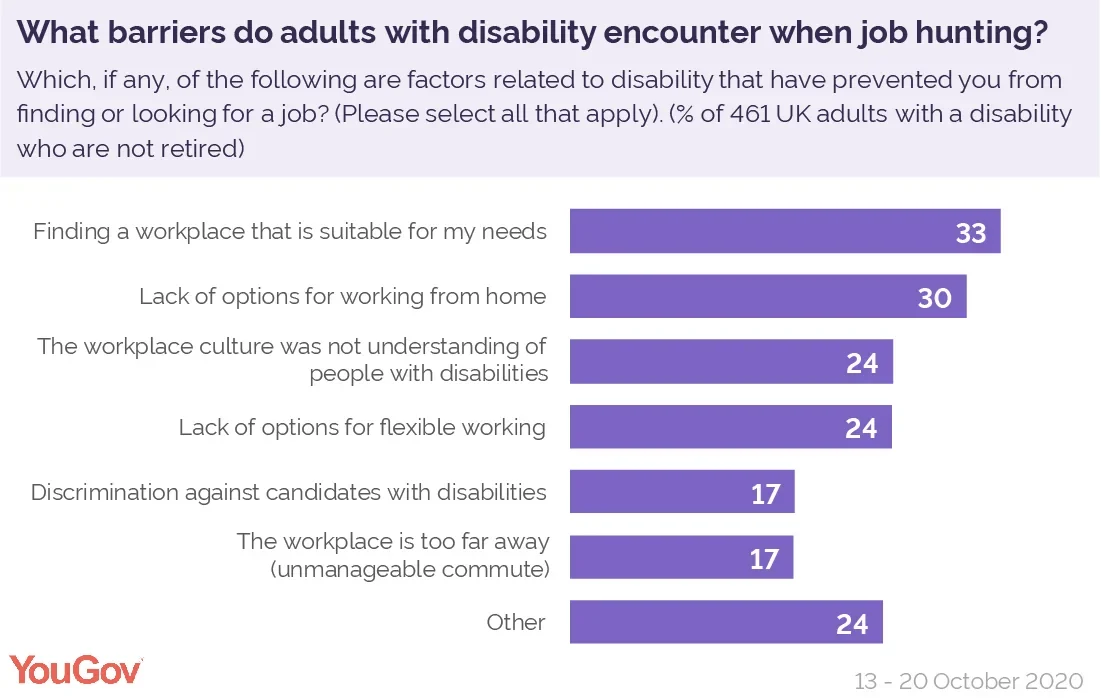
When it comes to what factors related to disability have prevented them from finding or looking for a job, one in three (33%) say it is finding a workplace that suits their needs (33%), with almost as many (30%) say the lack of options for working from home is a barrier. Approaching a quarter (24%) state that workplace culture was not understanding of people with disabilities – a figure that rises to 37% among those with a learning, social, or a memory disability.
A sixth (17%) have perceived active discrimination against candidates with disabilities.
How many disabled adults have asked their employers to make changes for them?
One of the core tenets of the Equality Act 2010 is that employers have a duty to make reasonable adjustments to enable disabled people to overcome barriers they experience in employment to ensure they could do a job to the same standards as a candidate without disability.
While just over half (53%) have not asked their employer to make changes, 45% of working disabled adults have requested these adjustments.
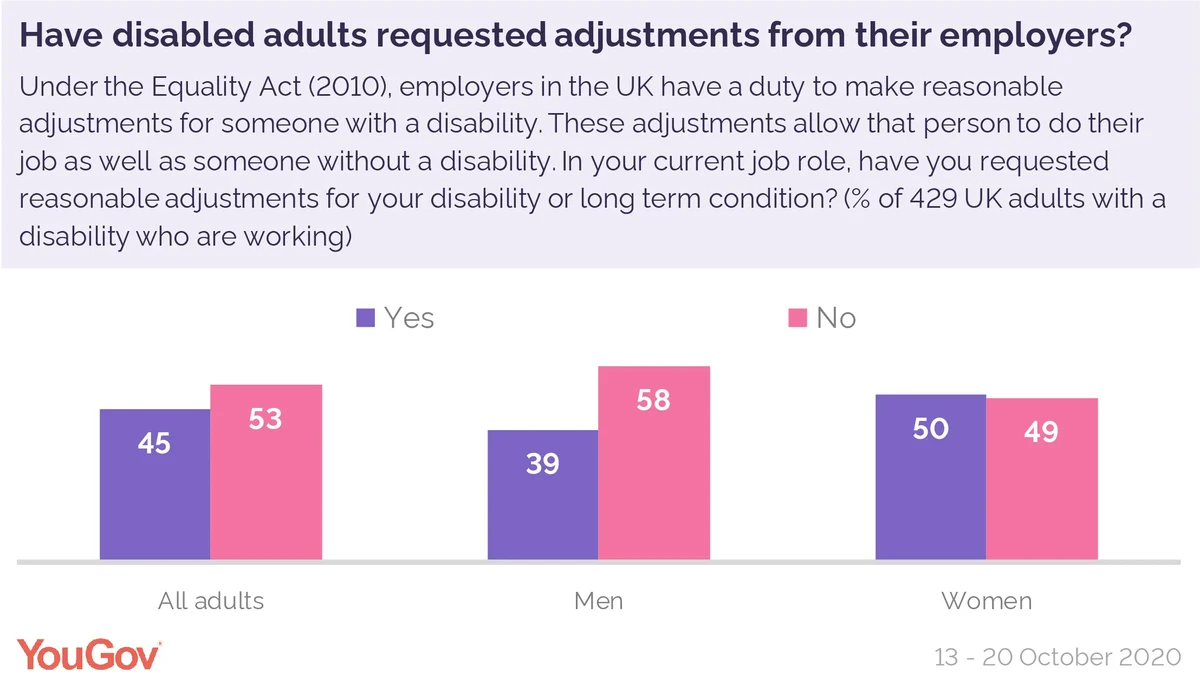
Working men with disability are less likely than women to have requested adjustments (men 39% have asked versus 58% who have not, among women 50% have asked their employer to make changes versus 49% who have not). Among those adults who say their disability limits them a lot, 58% requested changes while 38% have not.
Our research finds that the vast majority (93%) of disabled adults who request their employer makes reasonable adjustments say either all (60%) or some (33%) of the changes have been made.
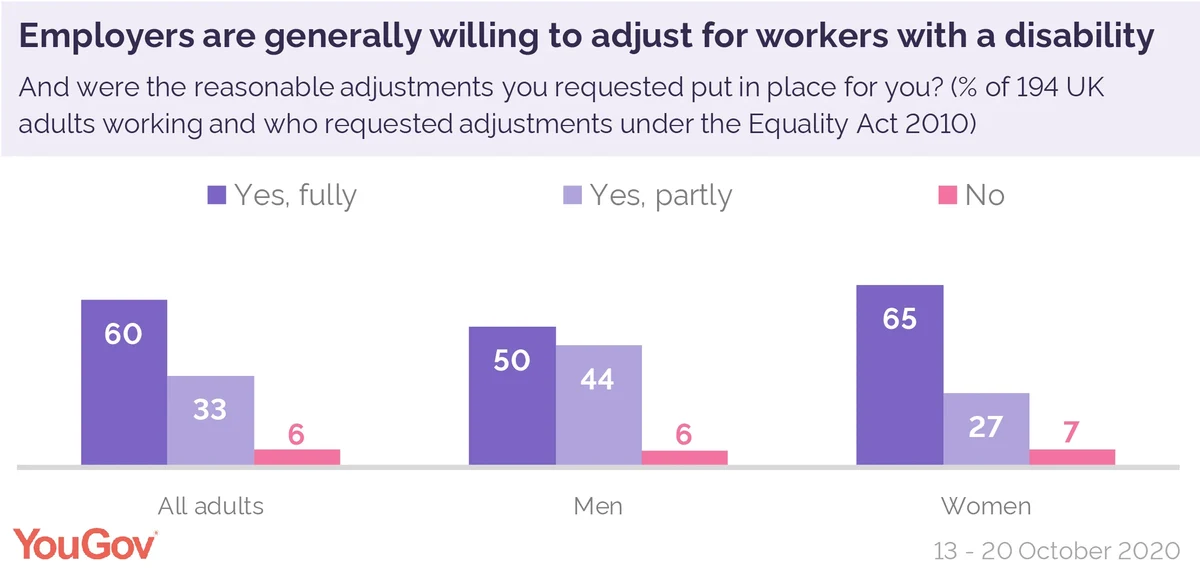
However, there is a clear difference between women and men. While 65% of women say that all their reasonable adjustment requests have been met, among men the figure falls to 50%. Men are more likely to say their requests have been partially met (44% versus 27% for women).
Our research finds that adults with disability report that support from employers during the COVID-19 pandemic is more likely to have increased than decreased.
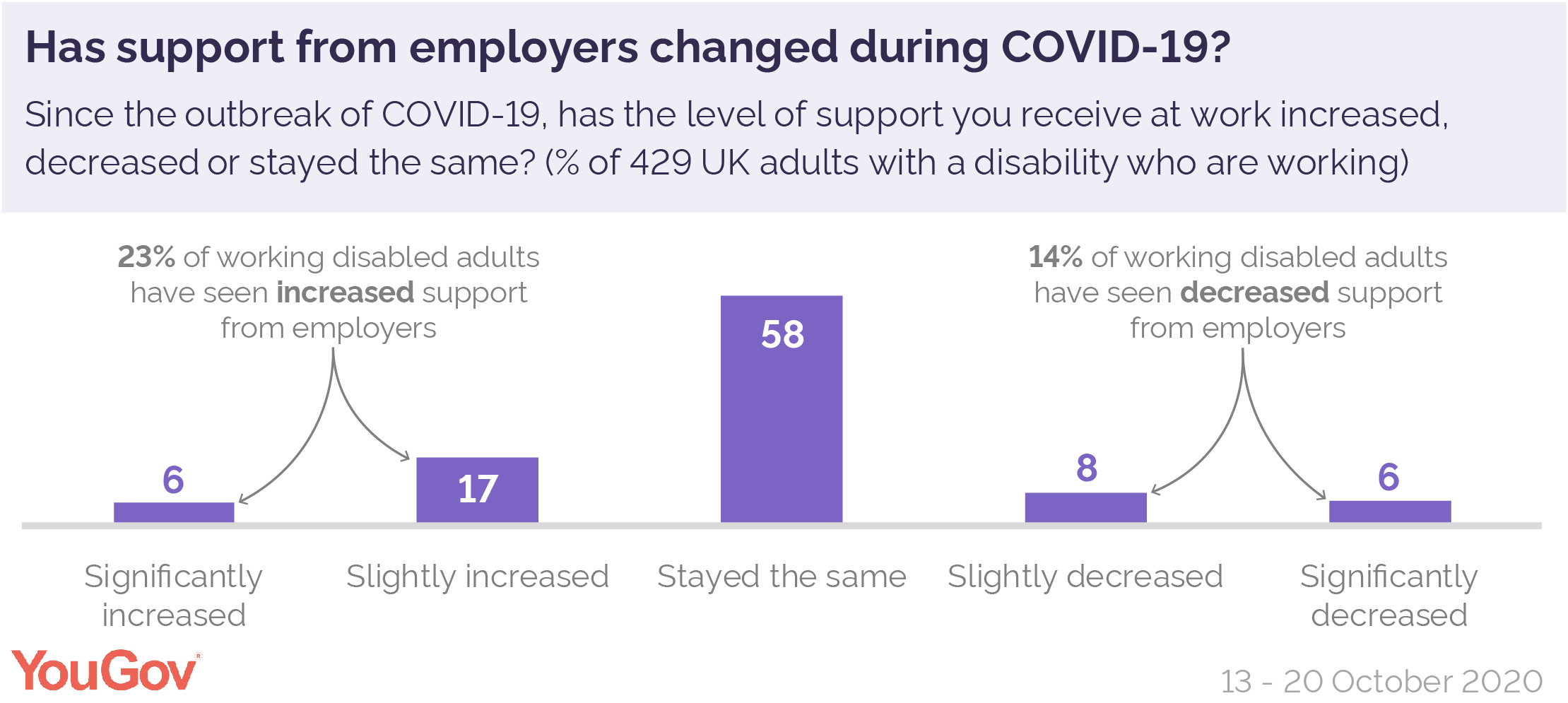 While the majority (58%) say the level of support they receive from their employer has remained the same, nearly a quarter (23%) say they have seen the level of support from their workplace increased, with one in seven (14%) saying that support decreased
While the majority (58%) say the level of support they receive from their employer has remained the same, nearly a quarter (23%) say they have seen the level of support from their workplace increased, with one in seven (14%) saying that support decreased
Disability Confident, is it working?
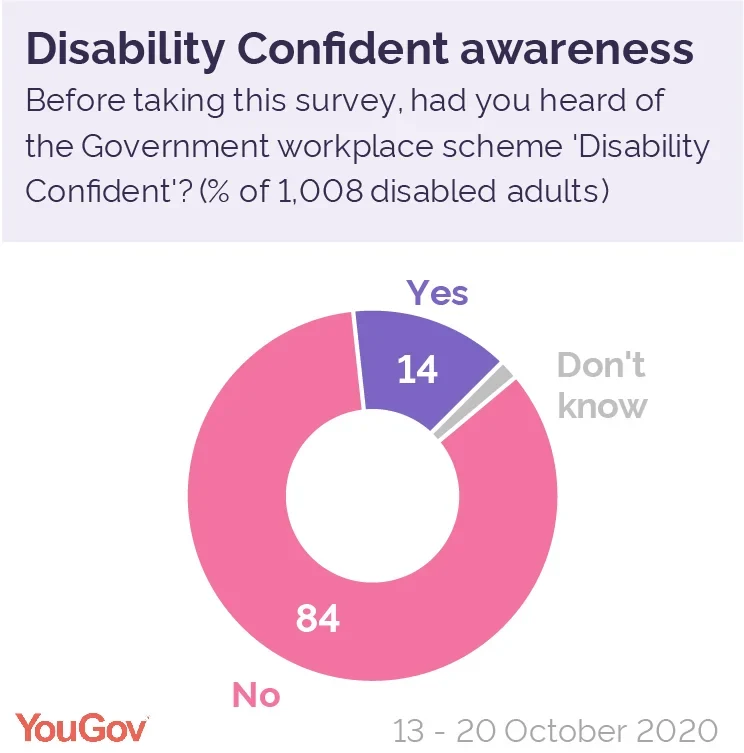
In addition to the Equality Act 2010, the UK government launched a new scheme entitled Disability Confident in 2016. The scheme aims to encourage employers to recruit and retain disabled people and those with health conditions, and to encourage others to do as so as well by promoting awareness.
However, while one in seven (14%) disabled adults have heard of the scheme, more than four in five (84%) have not. Awareness is better among younger respondents – but even here while a quarter (24%) have heard of the programme three in four (75%) have not.
Among those who say they have heard of the scheme opinion is split on whether it has been effective (37%) or not (36%) at promoting employment for the disabled.
Of those aware of the scheme, just under half (47%) say their current employer is registered as Disability Confident, while 26% say theirs is not. A quarter (26%) are not sure. Among those not aware of the programe, 87% are unsure if their employer is a member or not.
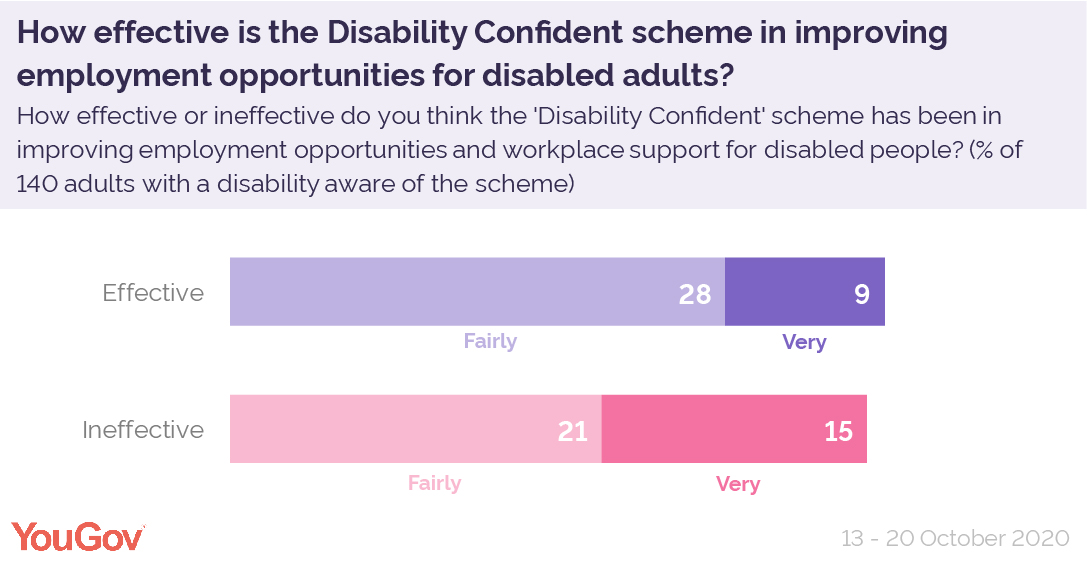 Are disabled adults concerned for their jobs?
Are disabled adults concerned for their jobs?
In the face of the ongoing pandemic, half (53%) of disabled adults who are working are either not all (19%) or not very (34%) concerned about their job security at the moment, compared to 46% who are either fairly (29%) or very (17%) concerned.
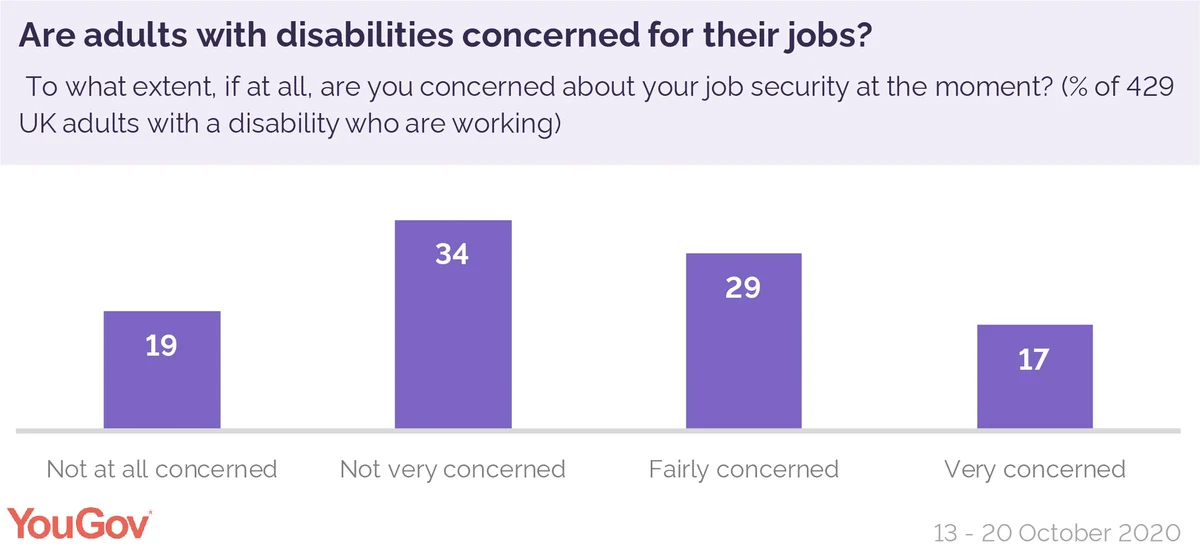
The research shows that a majority (57%) of those with a mental health disability are either fairly (33%) or very (24%) concerned about their job security compared to 42% who are not at all (14%) or not very (28%) concerned.
If they were to lose their jobs, just over half (54%) of disabled adults who are working say they do not think their disability would play a hand in it. However, two fifths (41%) suspect that their disability might possibly be a factor in them losing their job, with one in eight (12%) definitely believing it would.
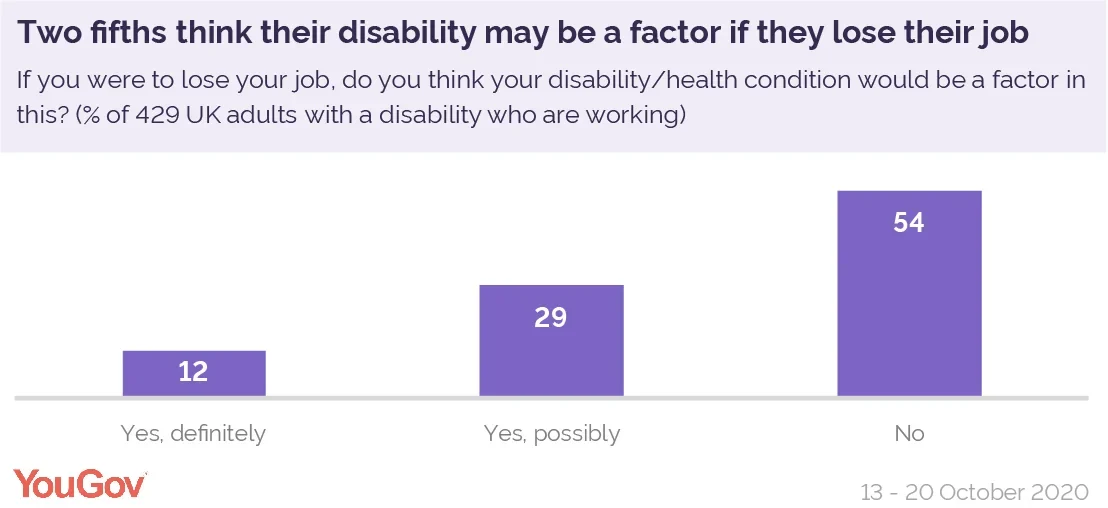
Among those in employment who are limited a lot by their disability, two thirds (66%) suspect that if they were to be made redundant their disability would have been a factor, with 27% being sure it would do so.
Does the Equality Act do enough to protect disabled adults?
A decade on from the Equality Act 2010, half (51%) feel existing legislation is not robust enough to protect the rights of the disabled. This an opinion is consistent among the different groups and types of disability this study looked at. Only one in five (20%) of disabled adults think that the Equality Act in its current form does enough to protect their rights.
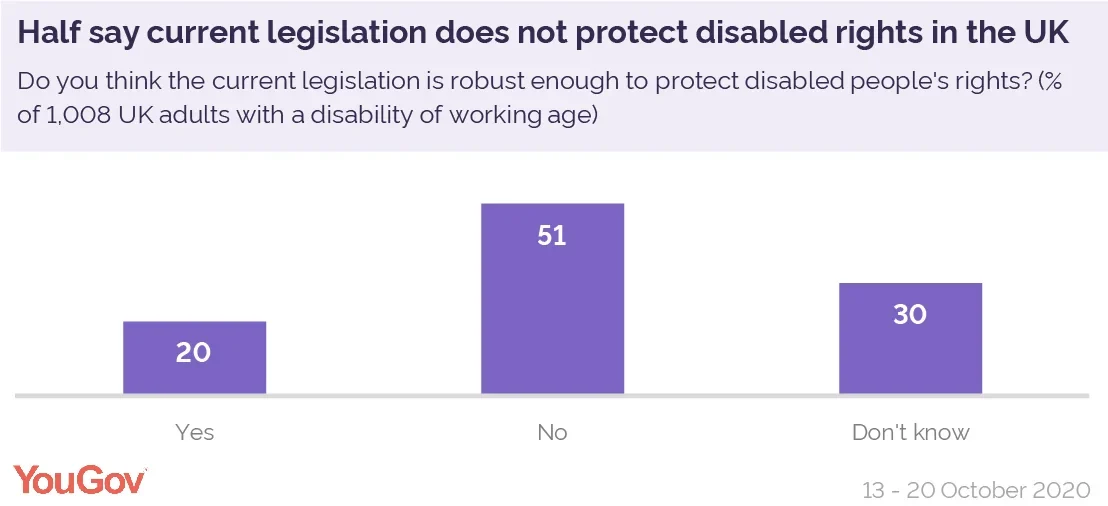
Six in ten (61%) adults with learning, social or memory disabilities do not feel legislation currently in place protects their rights, a view shared by almost as many (59%) with mental health disabilities and half (52%) of those with visual or hearing disabilities.
This data was previously featured on the BBC
Learn more about YouGov Custom Research here









